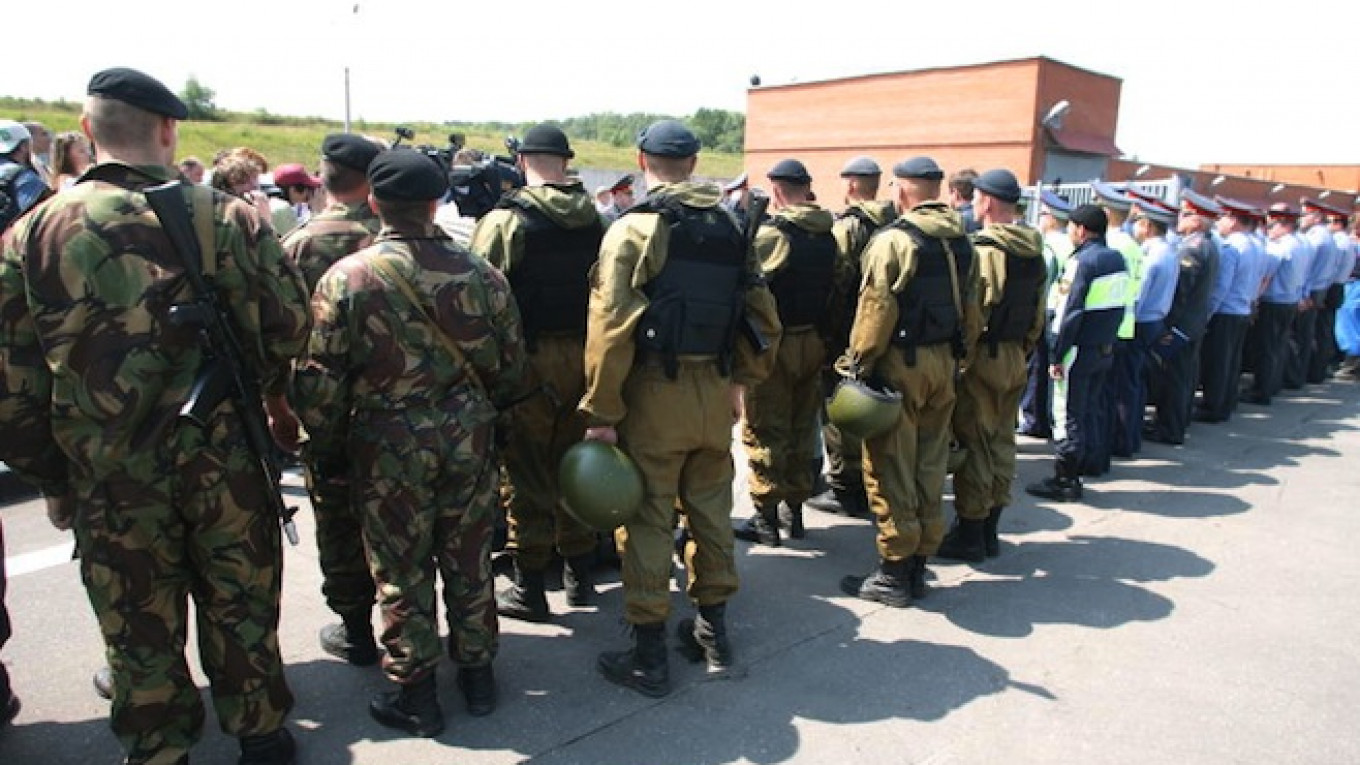Russia's Interior Ministry troops are conducting large-scale exercises involving a “full arsenal” of anti-riot weapons to practice suppressing political protests such as the one that toppled the pro-Russian administration of neighboring Ukraine last year, a news report said Thursday.
The week-long exercises dubbed “Barrier-2015” will continue through Friday around the country, including the North Western, Central, Volga, North Caucasus, and Southern federal districts, and in Crimea, interior troops spokesman Vasily Panchenkov said, RIA Novosti reported.
The exercises are “based on events that took place in recent past in one of the neighboring countries,” Panchenkov was quoted as saying. “In order to create conditions close to real events, the attributes of those events were used, up to burning car ties and stones and bottles being thrown at servicemen.”
The goal of the drills is to “combat expressions of terrorism and extremism,” Panchekov said.
Political protests seemed to be the Kremlin's major fear following the events that brought down the administration of Ukraine's former President Viktor Yanukovych a year ago, which began in Kiev's central Maidan square.
Moscow used Yanukovich's ouster as a pretext for annexing Crimea, claiming that forces that came to power in Ukraine in the wake of the protests were “fascists.”
A pro-Kremlin group called “Anti-Maidan” in reference to the center and symbol of Ukraine's protests has also recently formed in Russia to combat political protest movements.
During the military exercises, which have been underway since April 2, interior troops “practice various scenarios of developments, including the use of the full arsenal of special means with which employees of the interior troops and law-enforcement bodies are equipped,” Panchenkov said, RIA Novosti reported.
The equipment include “irritant gases, water cannons and various types of military technologies and special weapons of non-lethal impact,” he was quoted as saying.
Russia's defense and security industries have also demonstrated to the Interior Ministry their new “developments for such situations,” including fire-resistant protective clothing capable of withstanding the flames of Molotov cocktails, and unspecified samples of “new non-lethal weapons,” Panchenkov said, according to RIA Novosti.
A Message from The Moscow Times:
Dear readers,
We are facing unprecedented challenges. Russia's Prosecutor General's Office has designated The Moscow Times as an "undesirable" organization, criminalizing our work and putting our staff at risk of prosecution. This follows our earlier unjust labeling as a "foreign agent."
These actions are direct attempts to silence independent journalism in Russia. The authorities claim our work "discredits the decisions of the Russian leadership." We see things differently: we strive to provide accurate, unbiased reporting on Russia.
We, the journalists of The Moscow Times, refuse to be silenced. But to continue our work, we need your help.
Your support, no matter how small, makes a world of difference. If you can, please support us monthly starting from just $2. It's quick to set up, and every contribution makes a significant impact.
By supporting The Moscow Times, you're defending open, independent journalism in the face of repression. Thank you for standing with us.
Remind me later.






